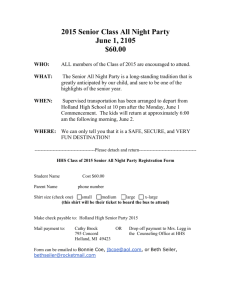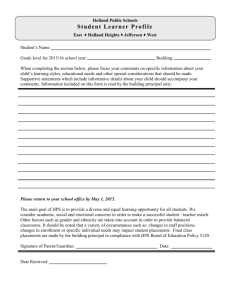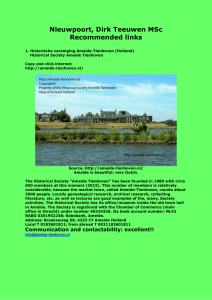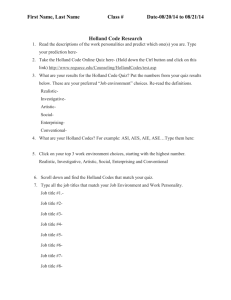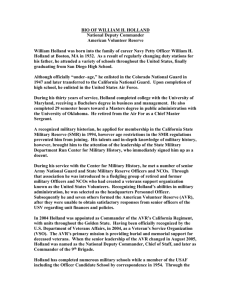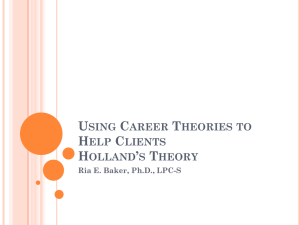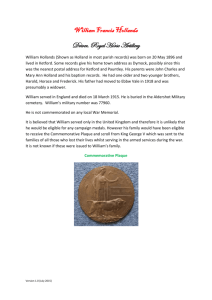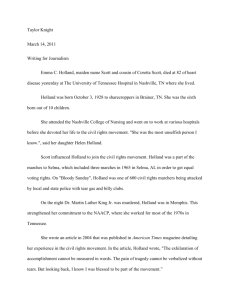DOC - The Career Center - Florida State University
advertisement
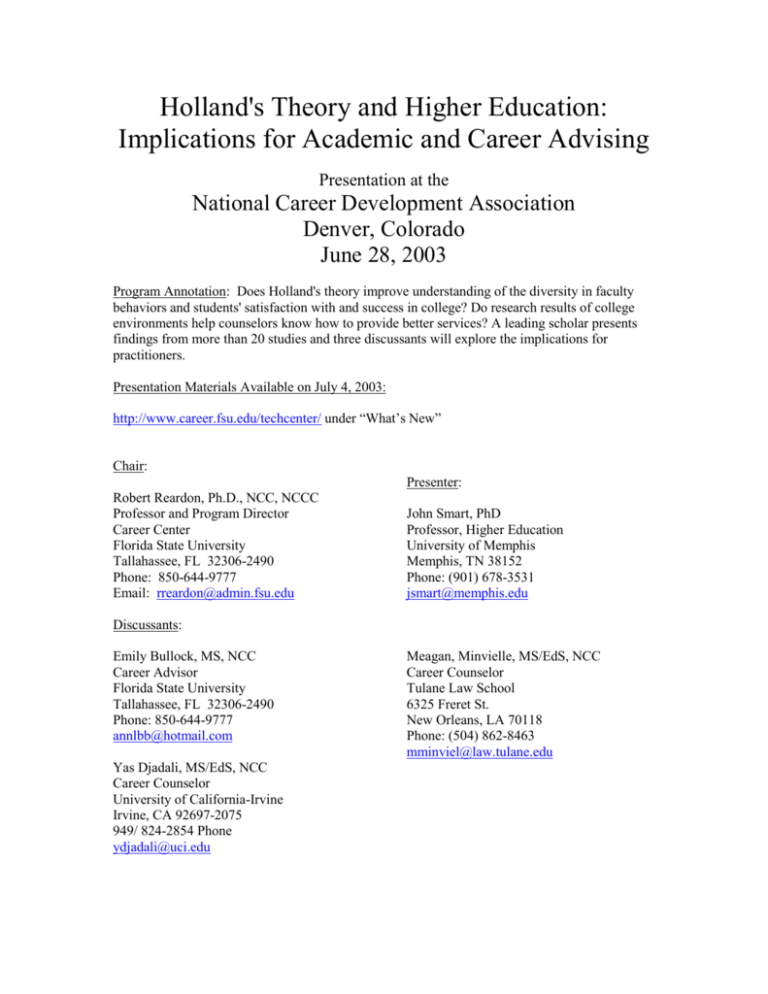
Holland's Theory and Higher Education: Implications for Academic and Career Advising Presentation at the National Career Development Association Denver, Colorado June 28, 2003 Program Annotation: Does Holland's theory improve understanding of the diversity in faculty behaviors and students' satisfaction with and success in college? Do research results of college environments help counselors know how to provide better services? A leading scholar presents findings from more than 20 studies and three discussants will explore the implications for practitioners. Presentation Materials Available on July 4, 2003: http://www.career.fsu.edu/techcenter/ under “What’s New” Chair: Presenter: Robert Reardon, Ph.D., NCC, NCCC Professor and Program Director Career Center Florida State University Tallahassee, FL 32306-2490 Phone: 850-644-9777 Email: rreardon@admin.fsu.edu John Smart, PhD Professor, Higher Education University of Memphis Memphis, TN 38152 Phone: (901) 678-3531 jsmart@memphis.edu Discussants: Emily Bullock, MS, NCC Career Advisor Florida State University Tallahassee, FL 32306-2490 Phone: 850-644-9777 annlbb@hotmail.com Yas Djadali, MS/EdS, NCC Career Counselor University of California-Irvine Irvine, CA 92697-2075 949/ 824-2854 Phone ydjadali@uci.edu Meagan, Minvielle, MS/EdS, NCC Career Counselor Tulane Law School 6325 Freret St. New Orleans, LA 70118 Phone: (504) 862-8463 mminviel@law.tulane.edu An Alternative Application of Holland’s Theory and It’s Implications for Career Counseling in College Settings John C. Smart, Ph.D. Professor of Educational Research & Higher Education College of Education, 100 Ball Hall The University of Memphis Memphis, TN 38152-3570 E-mail: jsmart@memphis.edu Abstract The central premise of Holland’s theory is that vocational and educational stability, satisfaction, and success are contingent on the congruence or “fit” between individuals’ personality types and their work or educational environments. Holland’s theory and the associated instruments used to assess the personality types of individuals and the nature of their work and educational environments have been widely used by researchers and counselors in their efforts to assist individuals select work and educational environments in which they have the greatest likelihood of persistence, satisfaction, and success. This paper has two primary purposes. First, we provide a description of how the congruence assumption of Holland’s theory has been traditionally applied by researchers and counselors. We illustrate this initial purpose by using examples from two of our recent studies. The second purpose of the paper is to propose an alternative interpretation and application of Holland’s congruence assumption, also using examples from our most recent study. Our alternative application of the congruence assumption focuses on the perceived learning outcomes of students who have selected academic environments (i.e., college majors) that are incongruent with their primary personality types. We specifically seek to determine whether such students are doomed to lower levels of success or achievement by virtue of their having chosen an incongruent academic environment, as would be predicted by the traditional application of the congruence assumption. Our collective findings provide evidence that supports both the traditional and our alternative application of the congruence assumption. We conclude that the choice between the two approaches is predicated on one’s vision of what college students should seek to accomplish during their college experiences. The implications for college students and for academic and career counselors are dramatically different depending on one’s response to this fundamental issue. Ultimately, Holland’s theory has much to offer those who select either approach. References Association of American Colleges. (1985). Integrity in the college curriculum. Washington, DC: Association of American Colleges. Assouline, M. & Meir, E. I. (1987). Meta-analysis of the relationship between congruence and well-being measures. Journal of Vocational Behavior, 31, 319-332. Bowen, H. R. (1977). Investment in learning. San Francisco: Jossey-Bass. Ewell, P. T. (1984). The self-regulating institution. Boulder, CO: National Center for Higher Education Management Systems. Feldman, K. A., Smart. J. C., & Ethington, C. A. (2001). A further investigation of major field and person-environment fit: Sociological versus psychological interpretations of Holland’s theory. Journal of Higher Education, 72, 670-698. Feldman, K. A., Smart, J. C., & Ethington, C. A. (in press). What do college students have to lose?: Exploring outcomes of differences in person-environment fits. Journal of Higher Education. Gottfredson, G. & Holland, J. (1996). Dictionary of Holland occupational codes (3rd ed.). Odessa, FL: Psychological Assessment Resources. Gottfredson, L. S., & Richards, Jr., J. M. (1999) The meaning and measurement of environments in Holland’s Theory. Journal of Vocational Behavior, 55, 547-73. Holland J. L. (1997). Making vocational choices: A theory of vocational personalities and work environments. (3rd edition). Odessa, FL: Psychological Assessment Resources. Jacoby, B., Rue, P., & Allen, K. T. 1984). UMaps: A person-environment approach to helping students make critical decisions. Personnel & Guidance Journal, 62, 426-428. Lenning, O. T., Lee, Y. S., Micek, S. S., & Service, A. L. (1977). A structure for the outcomes and outcome-related concepts. Boulder, CO: National Center for Higher Education Management Systems. Nedwick, B. P. (1996). Public policy and public trust: The use and misuse of performance indicators in higher education. In J. C. Smart (ed.), Higher education: Handbook of theory and research (Vol. 11, pp. 47-89). Dordrecht, The Netherlands: Kluwer Academic Press. Roberts, A. O. H. (1980). Regression toward the mean and the regression-effect bias. New Directions for Testing and Measurement, 8, 5982. Rosen, D., Holmberg, K., & Holland, J. L. (1989). The college majors finder. Odessa, FL: Psychological Assessment Resources. Rosen, D., Holmberg, K., & Holland, J. L. (1989). The educational opportunities finder. Odessa, FL: Psychological Assessment Resources. Smart, J. C., Feldman, K. A., & Ethington, C. A. (2000). Academic disciplines: Holland’s theory and the study of college students and faculty. Nashville, TN: Vanderbilt University Press. Spokane, A. R. (1985). A review of research on person-environment congruence in Holland’s theory of careers. Journal of Vocational Behavior, 26, 306-343. Spokane, A. R. (1996). Holland’s theory. In D. Brown & L. Brooks (Eds.), Career choice and development (3rd edition, pp. 33-74). San Francisco: Jossey-Bass. Tranberg, M., Slane, S., & Ekeberg, E. (1993). The relation between interest congruence and satisfaction: A meta-analysis. Journal of Vocational Behavior, 42, 253-264. Walsh, W. B. & Holland, J. L. (1992). A theory of personality types and work environments. In W. B. Walsh, K. H. Craik, & R. H. Price (Eds.), Person-environment psychology: Models and perspectives (pp. 35-69). Hillsdale, NJ: Lawrence Erlbaum Associates.
